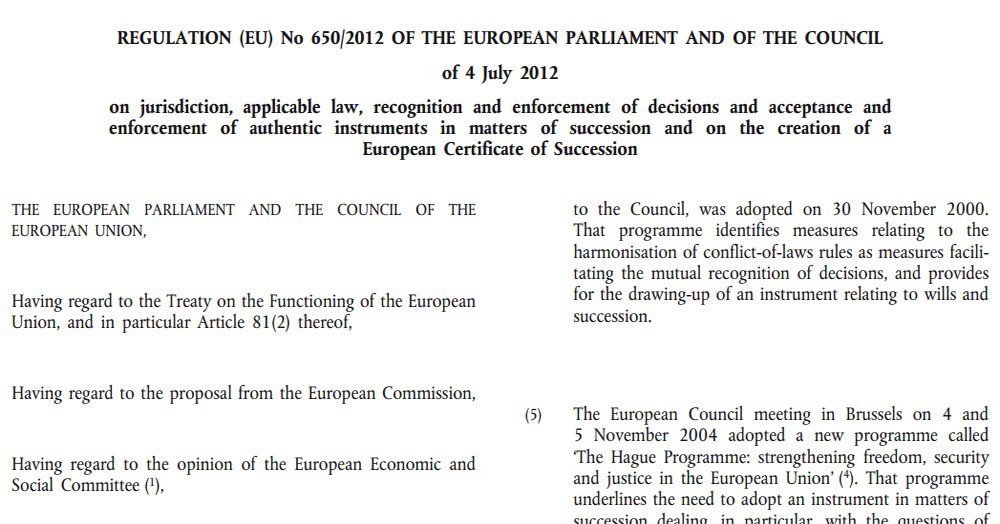Starting from next year inheritance rules in the EU will change. Wherever a property is situated in the 28 countries, after the owner’s death all the issues will be solved not in location area of the property but in his place of residence. Why has this decision been made and what can it promise to property owners?
For example: after death of a German resident, who has a house in France and an apartment in Italy, the issues of defining the heirs and the terms of the order of succession of these two properties will be resolved in accordance with the laws of Germany.

Two years ago, the European Union took another step towards unification of legal provisions and Regulation 650/2012 will come into operation. It concerns people who died after August 17, 2015. You must admit that it is strange to try to live by common rules, and die - by different ones. Indeed, the provisions of the law are brought into accordance with the logic: you will be judged where you lived. Why is it important? The fact is that in each country the laws of inheritance are different.
If you have citizenship in of one of the EU countries, you can choose whom to bequeath your property. But if you have an apartment in Spain, France or Portugal, according to the current rules, the government of these countries will not look at your will, but they will automatically give the lion's share of acquired property to stated by law heirs. Even against your will! By the way, the same occurs in Russia, where the underage children of the deceased and incapable of work (i.e. retired) are legally protected and are entitled to a part of the property - no matter what you specify in the will.

So, after the new rules come into force, you, a EU citizen, should only study the rules of the country where you live most of all, and find out what your children /grandchildren/ other concerned parties will get.
Regulation 650/2012 is so interesting that it can be divided into quotations. "In view of the increasing mobility of citizens and in order to ensure the proper administration of justice within the Union … this Regulation should provide that the general connecting factor for the purposes of determining both jurisdiction and the applicable law should be the habitual residence of the deceased at the time of death. In order to determine the habitual residence, the authority dealing with the succession should make an overall assessment of the circumstances of the life of the deceased during the years preceding his death and at the time of his death, taking account of all relevant factual elements, in particular the duration and regularity of the deceased’s presence in the State…"

The Europeans will confuse anyone, but in the Regulation there is one stipulation: in the will you can specify that the laws of your country of citizenship should be used instead of the laws of the resident country. And if you have multiple citizenship, you are free to choose any of the corresponding legislations.
Vicky Rodriguez explains to OPP Connect: "If, however, you have not made this election and you die habitually resident in a regulation state, that state will apply the law of your habitual residence to your succession which means that, at least in relation to the assets you leave in the member states, forced heirship provisions may apply, which means that certain heirs will always inherit, despite what your will says." Actually that is what we have mentioned above.

Another possibility: if it is clear from the circumstances, that at the time of the death the deceased was for sure more closely connected with a country that is different from his permanent residence, inheritance laws of this state should be used. It is not specified what means "closer connection" with the country which is different from the one where the person lives permanently.
All this is a brief overview of the provisions and it took the European Parliament 28 pages in a small font to present and justify it. Long live the European Union, where the laws are strictly observed not only in life, but after death too!
Text: Alexander Fetyukov, ee24.com